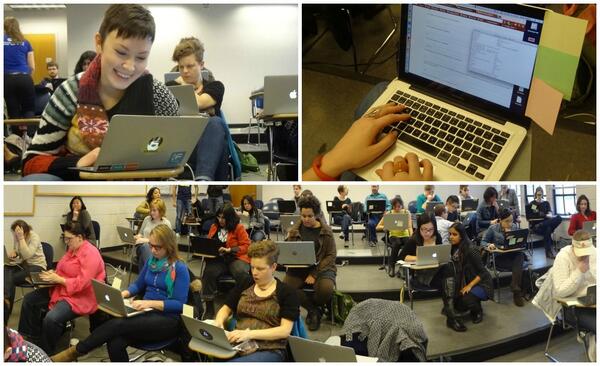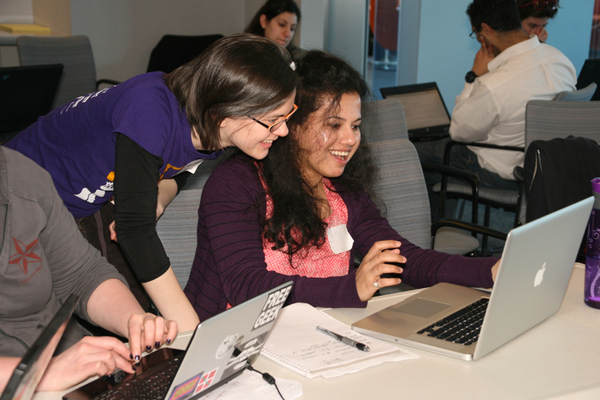

Steve McIntyre has been contributing to Debian since 1996, 2 years before I joined! But I quickly stumbled upon Steve: in 1999, he was struggling with getting his debian-cd script to produce 2 ISO images (it was the first time that Debian did no longer fit on a single CD), I helped him by rewriting debian-cd with a robust system to split packages on as many ISO images as required.
I remember those times very well because Steve was very supportive of my efforts and it was a real pleasure to get this done. His friendly nature probably also explains why he got elected Debian Project Leader twice!
Anyway, enough history, check out his interview to learn more about the great work he s doing nowadays. My questions are in bold, the rest is by Steve.
Raphael: Who are you?
Steve: I m a professional software engineer, 37, living in Cambridge
(England) with my new wife Jo. I studied for the EIST degree at the
University of Cambridge, then (like many people here, it seems) I just
forgot to go home again afterwards and settled here. I spent more of
my study time playing with Linux than working on my degree, so I
guess I m lucky that it worked and I found a career in that area!
Raphael: How did you start contributing to Debian?
Steve: During my time in college, I started hacking on software in my free
time, using Slackware as my first Linux distribution from the middle
of 1994. After encountering more and more problems with Slackware, I
was encouraged by a number of friends to make the jump over to Debian
and in October 1996 I did. The installation process back then was
much harder than anything people see today, but after
a long weekend I finally had my Debian system up and running.
I was already one of the main upstream developers for the Mikmod music
player at that time, so that very same weekend I applied to be a DD so
I could maintain it in Debian too. Back then, the NM process was much
simpler: I just mailed a key to Bruce and he set me up with an account
almost immediately!
I then found that Joey Hess had beaten me to it and already packaged Mikmod. Grrr!

Raphael: What s your biggest achievement within Debian?
Steve: Without a doubt, my proudest achievement within Debian is being
elected Project Leader for 2 years by the other developers. It s a
great feeling to have earned the trust of your friends and peers, and
also a great responsibility to go and help Debian where needed:
talking to the press about Debian, assisting wherever problems crop
up, etc. The DPL job is certainly a lot of hard work, and I have
nothing but respect for anybody who volunteers for it.
It s a
great feeling to have earned the trust of your friends and peers.
Elsewhere, I ve been leading the Debian CD team for years too, both
doing most of the maintenance of the debian-cd package and producing
and testing the regular installation CDs and DVDs that we ship to the
world. Again, this is a time-consuming job but it needs doing and it s
worthwhile.
Raphael: You re currently employed by ARM. What are you working on and are they supportive of your Debian involvement?
Steve: The situation within ARM is very interesting; I m employed in PDSW
(Processor Division, SoftWare), a new group founded just a couple of
years back to help improve the state of software on ARM. Most of the
people in the group are working on Free Software at this stage
(e.g. toolchains, browsers, Linux kernel), which is lovely. Some of
the engineers have also been seconded into a new non-profit company
Linaro, which is a collaboration
between ARM and a number of other companies investing in core Linux
software and tools for ARM-based CPUs. I m one of the ARM engineers in
Linaro, and I m a Technical Architect in the Office of the CTO. My
role includes looking at future projects for Linaro to help with
(e.g. ARM servers), but for the last few months I ve been
concentrating on the new armhf architecture in Debian, Ubuntu and
elsewhere.
armhf is a new architecture in Debian and Ubuntu terms, but it s not
strictly a new type of hardware. Instead, it s a new ABI. We have two
reasons for doing this work:
- It targets the latest version of 32-bit ARM CPUs (v7) and makes
better use of the hardware, for better performance. Compare
targetting i686 instead of i386, for example. We ll still support
the older armel port for the foreseeable future for users with
older hardware that can t run armhf.
- More importantly: we are standardising on the ABI / compiler
options / hardware support for future users.
In the past, there has been a huge amount of specialisation (aka
fragmentation) in the ARM Linux environment, and that worked OK for
specialised devices that only ever ran the software shipped with
them. ARM CPUs are now becoming more and more mainstream, so people
will expect to be able to install generic software on their
machines. That gives a requirement for a standard base platform, and
armhf (arm-linux-gnueabihf in GNU triplet terms) is that standard that
we are pushing in the community. Debian, Ubuntu, Fedora, Suse and
others are all going to use this, making compatibility possible.
I ve been working with a small team of people to make armhf happen,
helping where needed: putting together build machines; patching Debian
packages directly; discussing and fixing toolchain issues with Ubuntu
folks; agreeing ABI specifications with people from Fedora; advising
people from other distros bootstrapping their new ARM ports.
ARM and Linaro are very supportive of this work, and it s been lovely
being sponsored to work directly on Free Software like this. It s work
that will directly benefit ARM and its partners (of course!), but it s
also helping out more generally too: Debian QA work, cross-build
support, bootstrapping efforts, multi-arch. More and more of the ARM
market is driven by Free Software, and companies are acknowledging
that. I should probably also mention that we re hiring !

Raphael: What are your plans for Debian Wheezy?
Steve: There are three main tracks here.
Obviously, I m interested in seeing armhf release with Wheezy. We ve
just been added to Testing last weekend, so that s going well. We ve
got over 90% of the archive built now, and we re mopping up the
remaining issues.
I m the primary maintainer of cdrkit at this point, but I d prefer to
have it go away. Xorriso and the associated software in libisoburn is
almost capable of replacing all the aging cdrtools-derived software
that we have in Debian, The only missing feature that I m aware of is
creating the HFS hybrid filesystems that we use for installations on
Mac systems. I ve been talking with the upstream folks about this for
some time already, and I m hoping we can finish this soon enough that
we can get it into Wheezy.
Finally, I ve got the ever-growing wishlist of things for debian-cd.
We ve got the beginnings of an automated test suite that Mart n
Ferrari has written, but it needs integrating and improving. I want to
help get regular weekly/daily/release debian-live builds running on
the main CD build machine. There s work needed if we want to make good
installation media for the new multi-arch world, too. The Emdebian
people are asking for help making CD images The list goes on

Raphael: The ARM community seems to be very interested in multi-arch. Can you explain why?
Steve: There are a number of reasons for ARM people to be interested in multi-arch; two really stand out for me:
- With the historical issues around the plethora of ARM ABIs in the
wild, multi-arch will allow us to potentially support multiple ABIs
cleanly on one system. That allows users to have (for example) an
up-to-date system that makes the most of their current hardware,
yet also run legacy programs that might use an older ABI. There s
also a new 64-bit architecture coming (ARMv8) which will run older
32-bit software; again, multi-arch makes mixed installation of old
and new software reasonable.
- ARM has traditionally been a common target for cross-compilation,
and I d expect that to remain the case for a long time to come
yet. For a lot of embedded developers, using a big fast i386/amd64
machine to compile is much faster than using a limited-power small
ARM CPU. However, setting up sane cross-compilation environments
has long been a bugbear for developers. Getting the toolchain and
all the cross-architecture libraries to work together correctly can
be like black magic. This is potentially the killer app for
multi-arch: simply install the libraries for the target
architecture directly on your development machine. Install a simple
cross-gcc package and (maybe) qemu, and you re all set.
This is potentially the killer app for multi-arch: simply install the libraries for the target architecture [ ], install a simple cross-gcc package [ ] and you re all set.
Raphael: What s the biggest problem of Debian?
Steve: For me, Debian s biggest problem has been the same for a long time: we
are forever short of enough people to do the work that we re trying to
do. That might sound like a weird thing to claim when Debian is one of
the largest Free Software projects on the planet, but it s more a
statement of just how huge our goals are. Many of the largest things
in Debian are developed or controlled by very small teams working very
hard, and there s always a risk of losing people due to burnout in
those situations.
We are forever short of enough people to do the work that we re trying to do.
Some of the tasks that should be easy given our large
membership (e.g. large-scale packaging transitions) can often instead
take a very long time. We are fortunate to have more people wanting to
join in Debian s work all the time, but we also need to be careful to
keep on promoting what we re doing and recruiting new contributors,
encouraging them to get more and more involved in core work. Debian
gets ever bigger in terms of the size and the number of packages we
distribute; we re not currently matching that growth rate elsewhere.
Raphael: What motivates you to continue to contribute year after year?
Steve: This one is much easier to answer! The thing that first attracted me
to Debian was the fact that I could help to develop it, help to decide
how things could and should be done within it. Instead of being forced
to accept what some corporation decided I could do with my computer, I
could change the software to suit my needs and preferences. Alongside
that, I could get involved with a strong community of similar people
all over the world, all with their own strong opinions about how
software should work.
I joined in and found it was great fun and very rewarding. That hasn t
changed for me in the intervening years, and that s why I m still
around. I work on Debian because it helps me to get the OS that
I want to use. It seems that lots of people around
the world find it useful too, and that s awesome.

Raphael: Do you believe that Stefano Zacchiroli will be the first DPL who managed to stay 3 consecutive years on the seat? Would you like him to candidate again?
Steve: To be honest, I would be very surprised if Zack stood again for DPL
this year. He told me himself that he wasn t planning on it, and I can
understand that decision. He s been an awesome DPL in my opinion, and
I m glad that he took the job. But: it is also a very difficult and
time-consuming task that would be enough to wear down anybody. If Zack
does decide to stand again, I would support him 100%. But I know that
we also have lots of other good people in Debian who would be ready to
take up the challenge next.
Raphael: Is there someone in Debian that you admire for their contributions?
Steve: There are lots of people I admire in Debian, so many so that I almost don t want to list individuals here for fear of missing people out. But

Bdale Garbee has been an inspiration to many of us, for many
years. He s technically excellent, a great friend to many of us, an
endless source of sage advice and (last but not least) he has some
wonderful stories to tell about his experiences over the years. On top
of that, he s just cool.

Christian Perrier is another exceptional developer, in my eyes he s
great at co-ordinating people in translations, working tirelessly to
make this very important part of Debian work better and better with
every release. He s also a really nice guy and we all love him.
I also have to mention Joey Hess here, whether he likes it or
not. *grin* He s been responsible for so many good things in Debian
over the years, even if he did steal my first package
Finally, the teams of people who make sure that Debian is
always working: the security team and DSA. The rest
of us can choose to take time off from Debian to go and do other
things, but these people need to cover things every day. That s a
major responsibility, and I salute them for taking on that challenge.
Thank you to Steve for the time spent answering my questions. I hope you enjoyed reading his answers as I did. Note that you can find older interviews on
http://wiki.debian.org/PeopleBehindDebian.
Subscribe to my newsletter to get my monthly summary of the Debian/Ubuntu news and to not miss further interviews. You can also follow along on Identi.ca, Google+, Twitter and Facebook.
One comment Liked this article? Click here. My blog is Flattr-enabled.
 Earlier this year, I helped plan and run the Community Data Science Workshops: a series of three (and a half) day-long workshops designed to help people learn basic programming and tools for data science tools in order to ask and answer questions about online communities like Wikipedia and Twitter. You can read our initial announcement for more about the vision.
The workshops were organized by myself, Jonathan Morgan from the Wikimedia Foundation, long-time Software Carpentry teacher Tommy Guy, and a group of 15 volunteer mentors who taught project-based afternoon sessions and worked one-on-one with more than 50 participants. With overwhelming interest, we were ultimately constrained by the number of mentors who volunteered. Unfortunately, this meant that we had to turn away most of the people who applied. Although it was not emphasized in recruiting or used as a selection criteria, a majority of the participants were women.
The workshops were all free of charge and sponsored by the UW Department of Communication, who provided space, and the eScience Institute, who provided food.
Earlier this year, I helped plan and run the Community Data Science Workshops: a series of three (and a half) day-long workshops designed to help people learn basic programming and tools for data science tools in order to ask and answer questions about online communities like Wikipedia and Twitter. You can read our initial announcement for more about the vision.
The workshops were organized by myself, Jonathan Morgan from the Wikimedia Foundation, long-time Software Carpentry teacher Tommy Guy, and a group of 15 volunteer mentors who taught project-based afternoon sessions and worked one-on-one with more than 50 participants. With overwhelming interest, we were ultimately constrained by the number of mentors who volunteered. Unfortunately, this meant that we had to turn away most of the people who applied. Although it was not emphasized in recruiting or used as a selection criteria, a majority of the participants were women.
The workshops were all free of charge and sponsored by the UW Department of Communication, who provided space, and the eScience Institute, who provided food.
 The curriculum for all four session session is online:
The curriculum for all four session session is online:
 Modern desktop environments like
Modern desktop environments like 

 Release 0.2.6 of
Release 0.2.6 of






 Back in 2004 when
Back in 2004 when 
 Steve McIntyre has been contributing to Debian since 1996, 2 years before I joined! But I quickly stumbled upon Steve: in 1999, he was struggling with getting his debian-cd script to produce 2 ISO images (it was the first time that Debian did no longer fit on a single CD), I helped him by rewriting debian-cd with a robust system to split packages on as many ISO images as required.
I remember those times very well because Steve was very supportive of my efforts and it was a real pleasure to get this done. His friendly nature probably also explains why he got elected Debian Project Leader twice!
Anyway, enough history, check out his interview to learn more about the great work he s doing nowadays. My questions are in bold, the rest is by Steve.
Raphael: Who are you?
Steve: I m a professional software engineer, 37, living in Cambridge
(England) with my new wife Jo. I studied for the EIST degree at the
University of Cambridge, then (like many people here, it seems) I just
forgot to go home again afterwards and settled here. I spent more of
my study time playing with Linux than working on my degree, so I
guess I m lucky that it worked and I found a career in that area!
Raphael: How did you start contributing to Debian?
Steve: During my time in college, I started hacking on software in my free
time, using Slackware as my first Linux distribution from the middle
of 1994. After encountering more and more problems with Slackware, I
was encouraged by a number of friends to make the jump over to Debian
and in October 1996 I did. The installation process back then was
much harder than anything people see today, but after
a long weekend I finally had my Debian system up and running.
I was already one of the main upstream developers for the Mikmod music
player at that time, so that very same weekend I applied to be a DD so
I could maintain it in Debian too. Back then, the NM process was much
simpler: I just mailed a key to Bruce and he set me up with an account
almost immediately!
I then found that Joey Hess had beaten me to it and already packaged Mikmod. Grrr!
Steve McIntyre has been contributing to Debian since 1996, 2 years before I joined! But I quickly stumbled upon Steve: in 1999, he was struggling with getting his debian-cd script to produce 2 ISO images (it was the first time that Debian did no longer fit on a single CD), I helped him by rewriting debian-cd with a robust system to split packages on as many ISO images as required.
I remember those times very well because Steve was very supportive of my efforts and it was a real pleasure to get this done. His friendly nature probably also explains why he got elected Debian Project Leader twice!
Anyway, enough history, check out his interview to learn more about the great work he s doing nowadays. My questions are in bold, the rest is by Steve.
Raphael: Who are you?
Steve: I m a professional software engineer, 37, living in Cambridge
(England) with my new wife Jo. I studied for the EIST degree at the
University of Cambridge, then (like many people here, it seems) I just
forgot to go home again afterwards and settled here. I spent more of
my study time playing with Linux than working on my degree, so I
guess I m lucky that it worked and I found a career in that area!
Raphael: How did you start contributing to Debian?
Steve: During my time in college, I started hacking on software in my free
time, using Slackware as my first Linux distribution from the middle
of 1994. After encountering more and more problems with Slackware, I
was encouraged by a number of friends to make the jump over to Debian
and in October 1996 I did. The installation process back then was
much harder than anything people see today, but after
a long weekend I finally had my Debian system up and running.
I was already one of the main upstream developers for the Mikmod music
player at that time, so that very same weekend I applied to be a DD so
I could maintain it in Debian too. Back then, the NM process was much
simpler: I just mailed a key to Bruce and he set me up with an account
almost immediately!
I then found that Joey Hess had beaten me to it and already packaged Mikmod. Grrr!  Cute meme du jour:
Cute meme du jour:
 In other news, I am now in London and will be having a housewarming next Saturday (the 7th). whois will give you the address. Nearby stations include Battersea Park and Queenstown Road. Nearest tube is probably Clapham Common. 137, 156 and 452 buses stop at Priory Road, less than 5 minutes away. A bunch more stop at Wandsworth Road station, which is also a fairly short walk. It'll be an all day affair, so feel free to drop in at any time of the day assuming you don't fall into one of these categories:
In other news, I am now in London and will be having a housewarming next Saturday (the 7th). whois will give you the address. Nearby stations include Battersea Park and Queenstown Road. Nearest tube is probably Clapham Common. 137, 156 and 452 buses stop at Priory Road, less than 5 minutes away. A bunch more stop at Wandsworth Road station, which is also a fairly short walk. It'll be an all day affair, so feel free to drop in at any time of the day assuming you don't fall into one of these categories: One of the hard things about getting started with
One of the hard things about getting started with